May 15, 2025 | 17:27 GMT +7
May 15, 2025 | 17:27 GMT +7
Hotline: 0913.378.918
May 15, 2025 | 17:27 GMT +7
Hotline: 0913.378.918
In order to promote sustainable socio-economic development, it is essential that these solutions be implemented consistently and comprehensively. This will ensure that land resources are maintained, protected, and utilized effectively.
The development of specific mechanisms and policies is necessary to promote, support, and invest in agricultural production activities that are in alignment with the objectives of protecting and enhancing soil fertility and health, as well as effectively managing plant nutrition.
The government should allocate periodic financing (every five years) to evaluate the health of the soil in critical crop cultivation areas, including coffee, pepper, durian, and other significant export crops. This evaluation would serve as the foundation for the effective administration of plant nutrition, the gradual enhancement of soil fertility, and the restoration of degraded land.
Digitizing and incorporating soil health data into the national database will facilitate the administration and decision-making processes of the agricultural development sector at the national, regional, and local levels.
The objective of crop cultivation policies should be to effectively manage plant nutrition while simultaneously preserving and enhancing soil fertility and health. Developing soil fertility maps for specialized agricultural regions, for instance, can serve as a foundation for the rational application of fertilizers. Fertilizer manufacturers should receive assistance in implementing environmentally favorable production methods, which will improve efficiency, reduce waste, safeguard the ecological environment, and reduce greenhouse gas emissions.
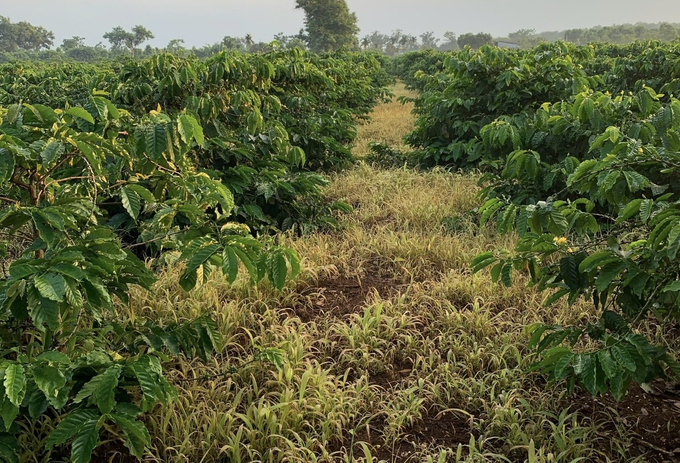
Some people in the Central Highlands still have the habit of using pesticides to kill weeds, leading to increasingly degraded soil. Photo: Truong Hong.
Enterprises that invest in producing high-quality organic fertilizers and soil-improving fertilizers for agricultural purposes should be prioritized. The objective of these fertilizers should be to improve the soil's physical and chemical properties, such as restoring soil microbial balance, improving aeration, water retention, and nutrient retention, and ameliorating soil acidity. Furthermore, it is imperative to create smart and functional fertilizers that have high nutrient utilization rates in order to promote sustainable and environmentally friendly agricultural production while simultaneously reducing emissions.
Additionally, in order to ensure a constant water supply for critical crop cultivation regions, the government must establish long-term investment policies for a comprehensive irrigation system. This will assist in the restoration of degraded lands that are on the brink of desertification as a result of water scarcity.
The government should prioritize ensuring sufficient funding for ongoing research on soil health and plant nutrition, with a particular emphasis on restoring degraded soil in the Central Highlands. The national soil and plant nutrition database must incorporate research findings concerning soil degradation and health to facilitate sustainable agricultural and forestry development.
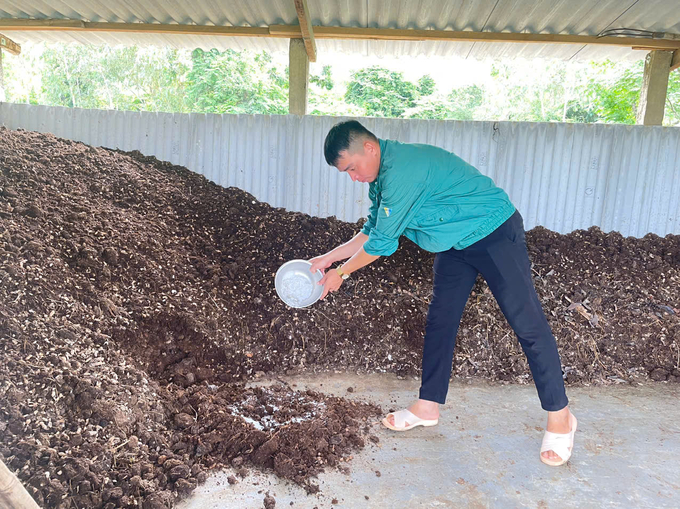
It is necessary to promote propaganda and have policies to encourage the use of organic fertilizers to improve soil in the Central Highlands. Photo: NNVN.
To establish usage protocols for a variety of products, such as organic and inorganic fertilizers, soil-improving fertilizers, and pesticides that are customized for specific crops in different ecological zones, regional research institutes and input supply companies must work together. The objective of these protocols should be to improve and preserve the fertility of the soil in the Central Highlands, thereby restoring the degraded soil. Sustainable agricultural development necessitates the adaptation of processes to fluctuations in soil fertility and the updating of the national database.
In order to improve productivity, product quality, economic efficiency, and soil fertility, the government should annually allocate suitable financing to agricultural extension agencies to facilitate the development and promotion of farming models that prioritize balanced and rational fertilizer use. Additionally, these models should aid in the mitigation of greenhouse gas emissions.
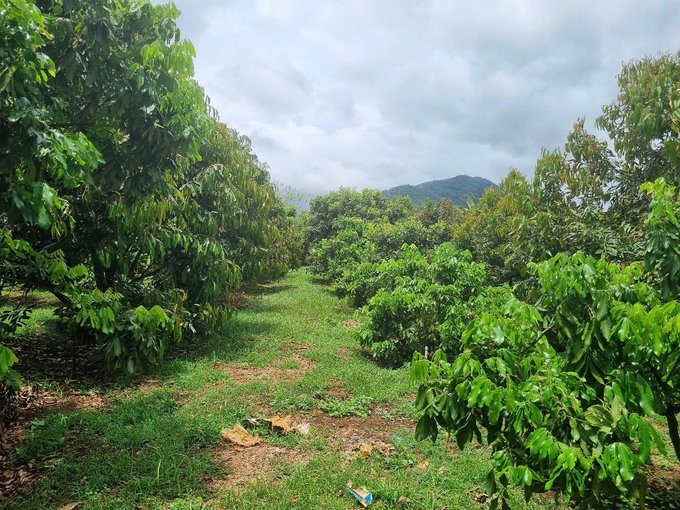
Intercropping coffee and durian together with using organic fertilizers is a solution to restore degraded land. Photo: TA.
In order to evaluate the efficacy of these models in restoring or enhancing soil fertility, they must be implemented over an extended period and applied to soils with fertility degradation issues. Clear reports and assessments of outputs are necessary to promptly implement successful models in other regions and extract valuable insights.
The government and agricultural enterprises should prioritize funding to better the knowledge and skills of farmers in agricultural practices through training programs that enhance their production capacity. These skills encompass the prevention of runoff, erosion, and soil protection during crop cultivation, as well as the efficient and cost-effective use of fertilizer through balanced applications that are following soil fertility and crop yield, as outlined in the "4Rs" principle (Right source, Right rate, Right time, Right place).
The training of farmers should also include the prioritization of environmentally favorable biological agents, the responsible use of pesticides, and integrated pest management. In order to progressively restore, maintain, and improve soil fertility, it is essential to implement sustainable weed management and the combined use of organic, bio-organic, chemical, and soil-improving fertilizers.
By providing farmers with the knowledge and skills necessary to engage in agricultural practices that are beneficial to biodiversity, such as intercropping high-value commodities, it is possible to mitigate production risks, enhance soil fertility, and increase income per unit area. These practices are also essential for adjusting to the current challenges of climate change.
Farmers typically increase fertilizer usage by 30–40% in response to elevated agricultural product prices. Consequently, it is imperative to prioritize training programs on the use of fertilizers and pesticides in order to mitigate the risk of nutrient and chemical overuse, which causes soil and water pollution and accelerates soil degradation.
In order to standardize the content and knowledge of agricultural training programs, it is imperative to create comprehensive training materials on soil health and plant nutrition.
Raising awareness of the significance of soil health in the context of current and future agricultural production should be the primary objective of communication campaigns. The organization of seminars and workshops to disseminate knowledge about soil health and plant nutrition necessitates consistent and close collaboration with associations, organizations, and enterprises.
Translated by Linh Linh

(VAN) Vietnam's draft amendment to Decree No. 156 proposes a mechanism for medicinal herb farming under forest canopies, linking economic development to population retention and the sustainable protection and development of forests.

(VAN) In reality, many craft village models combined with tourism in Son La have proven effective, bringing significant economic benefits to rural communities.

(VAN) The international conference titled Carbon Market: International experiences and recommendations for Vietnam was successfully held recently in Ho Chi Minh City.

(VAN) According to the Project on rearranging provincial and communal administrative units, in 2025, the country will have 34 provinces/cities, 3,321 communes, wards, and special zones, and no district-level organization.
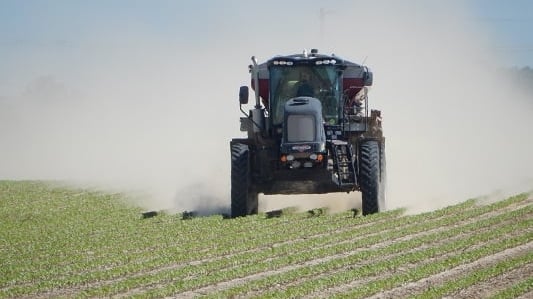
(VAN) The vice president of fertilizer with Stone X Group says the Trump administration’s tariffs are impacting fertilizer markets.
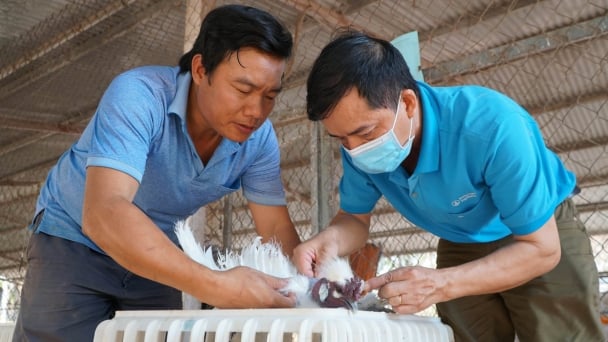
(VAN) Resolution 57 offers Vietnam a significant opportunity to narrow the global genetic technology disparity and convert its extensive genetic resources into commercial advantages.

(VAN) The Ministry of Agriculture and Environment will prioritize the implementation of five core and breakthrough solutions in science and technology, in addition to the seven groups of tasks identified in Decision No. 503.